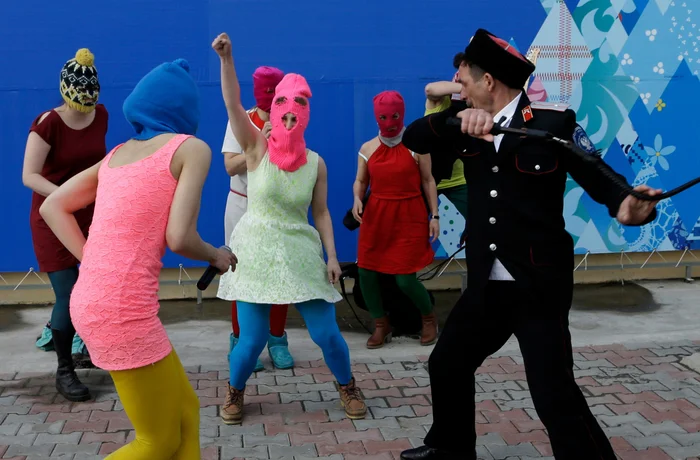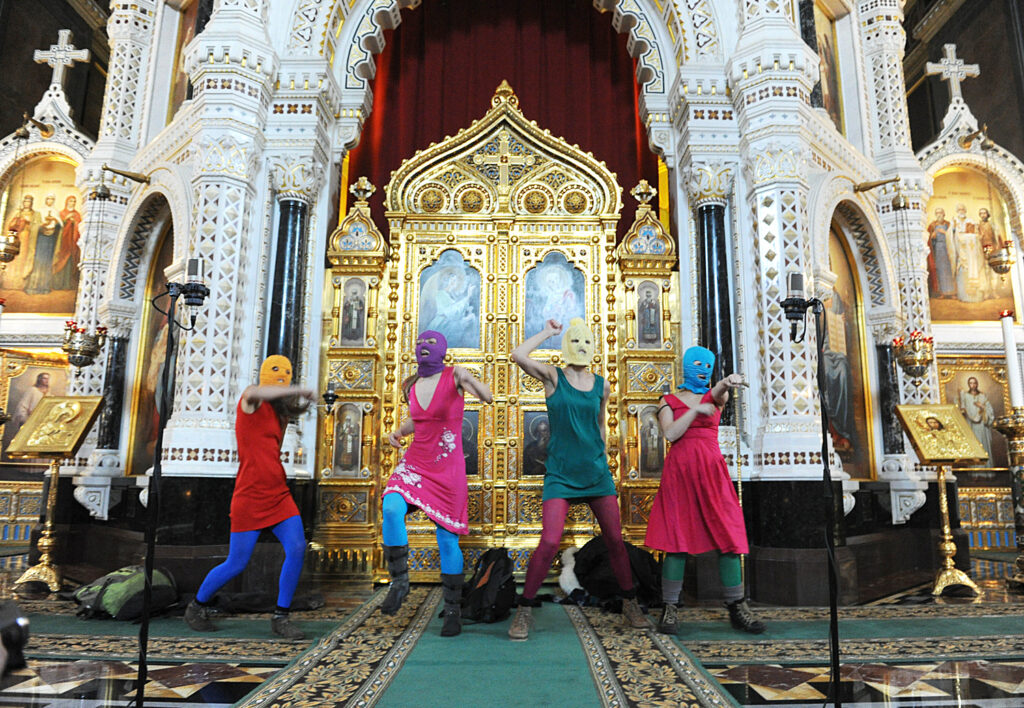Pussy Riot
In 2011, Nadya Tolokonnikova and Yekaterina (Kat) Samutsevich broke off from the radical street art group Voina to create a new anti-Putin, anti-fascist activist force with a more precise feminist focus. Thus, the two young adults created Pussy Riot in the same year as a feminist art collective and punk band. As of 2025, Pussy Riot has lead evocative protests and artistic initiatives for 14 years against Putin’s authoritarian regime in Russia, for freedom of speech, and for radical feminist progress around the world. The activist group takes influence from the underground feminist punk movement and zine, Riot Grrrls, as well as other influences like Guerrilla Girls, Simone de Beauvoir, and Judith Butler. Former members of Voina and founders of Pussy Riot— Nadya, Kat, & Peter, along with their videographer Tasya— had long participated in the group’s shocking public protests when, following the announcement that Vladimir Putin would run for a third presidential term, and motivated by concerns about shrinking freedom of speech, political corruption, and election fraud in Russia, the group aimed to create a “militant, punk-feminist, street band.” Pussy Riot immediately mobilized against the Putin’s government and took to the streets to tackle issues like gender and LGBTQ+ rights through disruptive punk music acts where the public couldn’t ignore them.
Pussy Riot became known for their unsanctioned public performances, which were filmed, edited, and released as music videos online. Their early notable actions included: “Free the Cobblestones,” “Kropotkin-Vodka,” “Death to Prison, Freedom to Protest,” “Putin’s Pissed Himself,” and “Punk Prayer,” all of which made international headlines. In 2012, following their public stunt “Punk Prayer,” three members (Nadya Tolokonnikova, Maria Alyokhina, and Kat Samutsevich) were arrested less than two weeks later. A fourth member, Diana Burkot was not able to escape arrest, and was jailed in a Russian prison for over two years.
Today, it is difficult to provide a concise list of Pussy Riot’s many notable initiatives and public performances, as the group has consistently managed to make international headlines with their provocative stunts dozens of times. From its conception, Pussy Riot has always been envisioned to be a fluid and anonymous collective. While some of the initial members have become well-known, especially activist Nadya Tolokonnikova, the group continues to rotate its key its core members and participants. Like the philosophies of groups like Anonymous or Guerilla Girls, Nadya maintains that “anybody can be Pussy Riot” by putting on one of their brightly colored balaclava ski masks and staging a protest against injustice. Today, various members are involved in diverse projects, focusing on human rights, prison reform (such as the Zona Prava project founded by Maria Alyokhina and Nadya Tolokonnikova), art activism, and feminist causes, both in Russia and internationally.
Pussy Riot remains a significant voice in contemporary socio-political discourse, using art and performance to challenge authoritarianism and advocate for social change in Russia and around the world.

City
Country
Region
Year of Creation
Featured Project

Resources
ABC News. “How Punk Band’s 1-Minute Protest Disrupted a Nation.” ABC News. 31 May 2013, https://abcnews.go.com/Entertainment/pussy-riot-punk-prayer-hbo-film-explodes-myths/story?id=19297475.
Beckett, Lois. “Pussy Riot’s founder built a ‘police state’ in an LA art gallery. Then the national guard arrived.” The Guardian. 15 Jun. 2025, https://www.theguardian.com/artanddesign/2025/jun/15/pussy-riot-nadya-tolokonnikova-police-state.
“Pussy Riot.” List of publication’s articles about Pussy Riot, The New York Times, https://www.nytimes.com/topic/pussy-riot.
Zychowicz, Jessica. “The Global Controversy over Pussy Riot: An Anti-Putin Women’s Protest Group in Moscow.” International Institute Journal, University of Michigan. vol. 2, no. 1, Fall 2012, http://hdl.handle.net/2027/spo.11645653.0002.104.
Talks & Interviews:
“Artist Talk with Nadya Tolokonnikova of Pussy Riot: Full Speech and Interview.” Uploaded by The Wende Museum. YouTube, 22 Apr. 2024, https://youtu.be/hAhOA5TCKR4?si=NU8HYPuvOTQwo92Q.
“Pussy Riot: the interview.” The Guardian, 26 Dec. 2012, www.theguardian.com/music/2012/dec/26/pussy-riot-protest-interview.
Voynovskaya, Nastia. “For Pussy Riot’s Nadya Tolokonnikova, Pride Is Still a Riot.” KQED. 26 Jun. 2025, https://www.kqed.org/arts/13978063/pussy-riot-nadya-tolokonnikova-pride-queerly-beloved-san-francisco-interview.
Zomorodi, Manoush. “Battling Putin with punk rock — Pussy Riot and the consequences of protest.” TED Radio Hour, NPR. 20 Oct. 2023, https://www.npr.org/transcripts/1206815220.
More Information
IMPORTANT: Profile pages for all collectives are in permanent development and have been built using information in the public domain. They will be updated progressively and in dialogue with the organizations by the end of 2024. New features and sections will be included in 2025, like featured videos, and additional featured projects. Please contact us if you discover errors. For more information on mapping criteria and to submit your organization’s information to be potentially included in the database, visit this page

